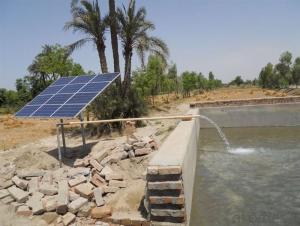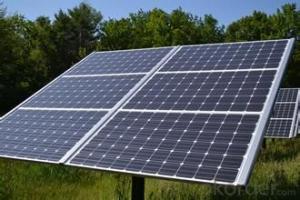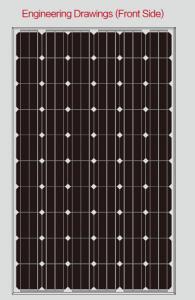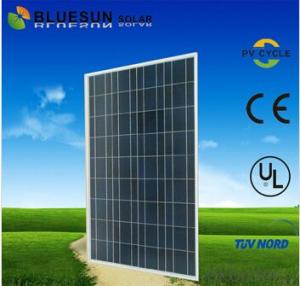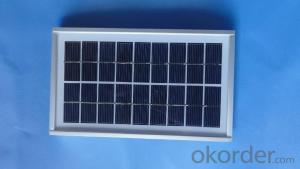PV Solar Panels 265w High Efficiency Poly
- Loading Port:
- China main port
- Payment Terms:
- TT OR LC
- Min Order Qty:
- 250 watt
- Supply Capability:
- 2500000 watt/month
OKorder Service Pledge
OKorder Financial Service
You Might Also Like
1.Product Description
We Offer the mono solar panels 250W, 255W, 260W 300W, poly solar panels 250W 260W 300W. You can find different mono solar panels and poly solar panels . We are the professional solar panels solar modules supplier.
Solar panels or modules use light energy (photons) from the sun to generate electricity through the photovoltaic effect. The majority of solar panels or modules use wafer-based crystalline silicon cells or thin-film cells based on cadmium telluride or silicon.
Solar panels constitute the solar array of a photovoltaic system that generates and supplies solar electricity in commercial and residential applications. Each solar panel or module is rated by its DC output power under standard test conditions, and typically ranges from 100w to 320 watts. Ground mounted photovoltaic system are usually large, utility-scale solar power plants. Their solar panels or modules are held in place by racks or frames that are attached to ground based mounting supports.
2.Technical Parameter
Model Type | |
Peak Power-Pmax(W) | 185 |
Open Circuit Voltage-Voc(V) | 44.2 |
Maximum Power Voltage-Vmp(V) | 36 |
Short Circuit Current-Isc(A) | 5.4 |
Maximum Power Current-Imp(A) | 5 |
Maximum System Voltage | 1000V DC |
Maximum Series Fuse Rating | 10A |
Power Tolerance | -1~+3% |
Temperature Coefficients of Pmax | -0.45%/℃ |
Temperature Coefficients of Voc | -0.348%/℃ |
Temperature Coefficients of Isc | 0.031%/℃ |
Nominal Operating Cell Temperature | 44.5±2℃ |
Standard Testing Condition(STC) | Irradiance:1000W/m²;Temperature:25℃;AM=1.5 |
Qualification Test Parameters | |
Operating Temperature | -40℃~+85℃ |
Storage Temperature | -40℃~+85℃ |
Pressure Bearing | ≥5400Pascal/m² |
Wind Bearing | ≥5400Pascal/m² |
Mechanical Characteristics | |
Cell Size | Mono 125*125mm±0.5 |
No.of Cells | 72pcs(6*12) |
Dimension | 1580*808*40mm |
Weight | 15.5Kg |
Glass | 3.2mm High Transmission,Low Iron |
Frame | Anodized Aluminum Alloy |
Junction Box | IP65Rated |
Internal Diodes | 3 Bypass Diodes |
Cable | 1*4.0mm² Length 900mm |
3.Production Flow
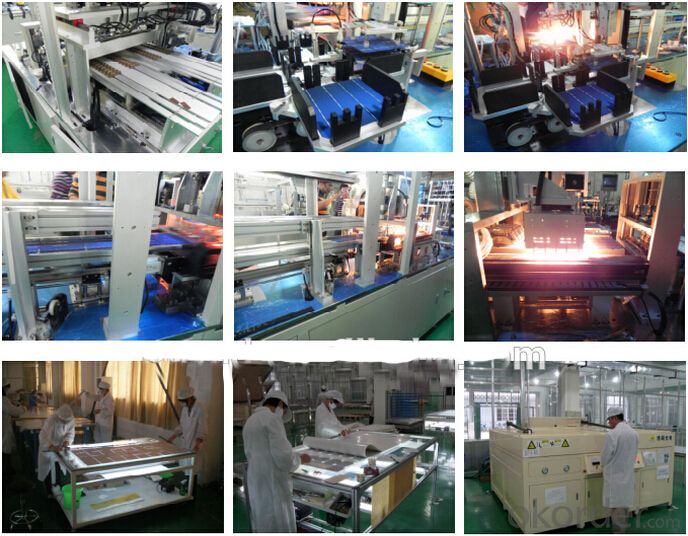
4. Use For
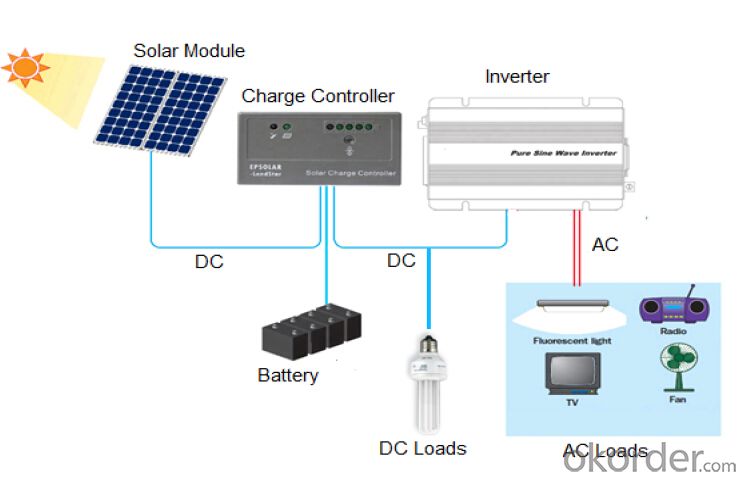
5. Pictures of Product
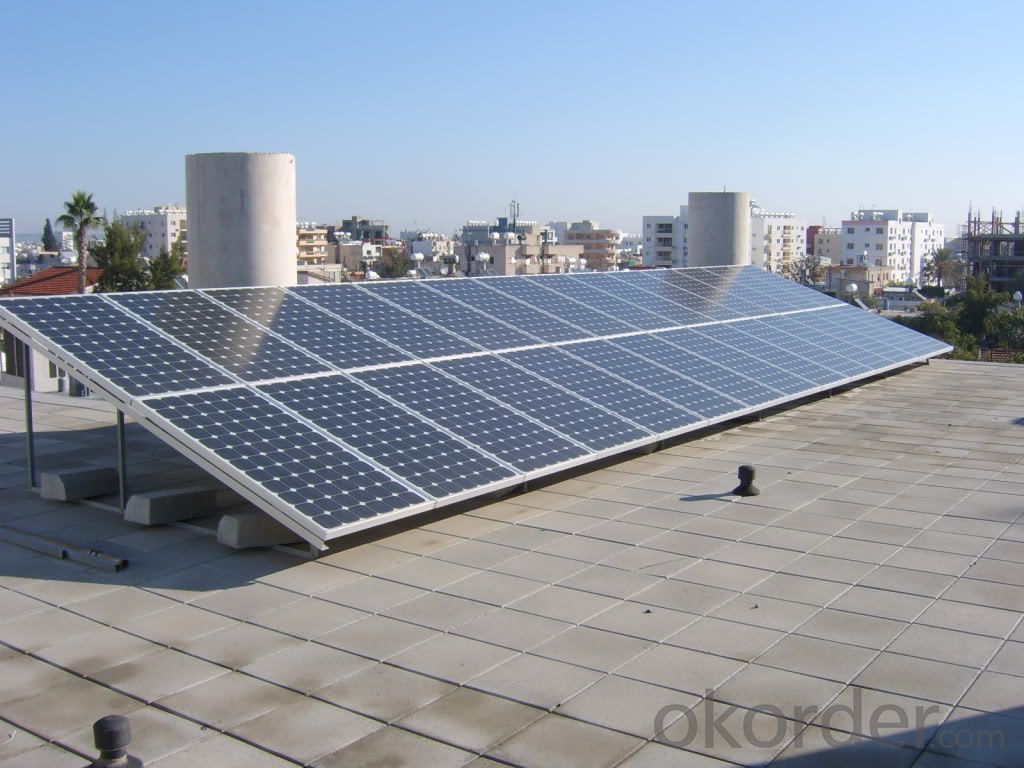
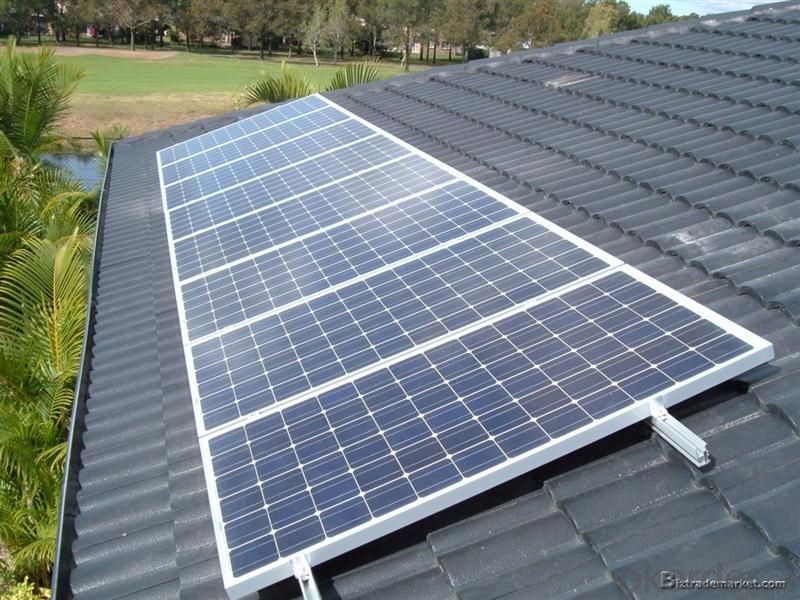
6.FAQ
We have organized several common questions for our clients,may help you sincerely:
1). What’s price per watt?
A: It’s depends on the quantity, delivery date and payment terms of the order. We can talk further about the detail price issue. Our products is high quality with lower price level.
2). Can you tell me the parameter of your solar panels?
We have different series of cells with different power output, both from c-si to a-si. Please take our specification sheet for your reference.
3). How do you pack your products?
We have rich experience on how to pack the panels to make sure the safety on shipment when it arrives at the destination.
4).Can you do OEM for us?
Yes, we can.
- Q:Hi, I am starting to get curious about the pros/cons of installing solar panels - has anyone done it and is it worth it?
- Solar is mroe expensive than just about every other form of generation for a centralized plant, but can still be cost-effective for a consumer living in the right place. This is because while a coal-fired plant may produce electricity for 2-3 cents per kWh, by the time it's marked up to retail, distributed, and taxed to get to a residence, it may be 5 cents per kWh - a figure which solar can match in many places.
- Q:Can solar panels be installed on parking lots or garages?
- Yes, solar panels can be installed on parking lots or garages. In fact, these areas are often ideal for solar panel installations due to the large open spaces and unobstructed sunlight exposure. Installing solar panels on parking lots or garages can help generate clean and renewable energy, reduce electricity costs, and provide shade for parked vehicles.
- Q:Hi everyone, I am a novice in solar energy system. I want to know if I am on the right track. Recently I bought a 30 W solar panel, 5 Amp controller, and a 22 Ah battery, how many watts and what kind of INVERTER do I need? I did an research some said 50 W and some said 300 W. And am I right on the 5 amp controller and 22 Ah battery to provide larger output of electric, or the higher the # the greater output for 30 W solar panel?Really appreciate for anyone who help!!!
- With a 30 watt panel, producing about 2 amps, your not going to have much power from that. A 22 AH battery will give you 2 AH of usage. A battery should never be drained below 50%. What this works out to be is simply Amp draw for 2 hours. Which equals to 2V light bulb that draws amp for 2 hours. Not much. Now to replace that usage with your 30 watt panel, provided the panel is clean and in max sunlight, it will take 6 hours. If you attach an inverter to your system for 5 Volt Usage then the DC voltage drawn from the battery is very high. Example: Say you use a 5 Volt component that requires 50 Watts per hour to operate. The inverter will draw 5 Amps out of the Battery every hour to operate that component. That gives you and /2 of use before the battery is down to 50%.. Maybe that will be enough to charge up a standard Laptop battery. I have 2 30 Watt panels that produce 5 Amps, 4 6V batteries that have 480 AH and a 25 Amp Controller with a booster that increase the amp output to 20 Amps per hour. I live full time in an RV and raise the panels to get max output when I am parked. This system provides me with all the 5V throught the 500 Watt inverter that I need. Good luck on you system.
- Q:Can solar panels be used for powering a hotel or hospitality establishment?
- Yes, solar panels can definitely be used to power a hotel or hospitality establishment. Solar energy is a renewable and sustainable source of power that can be harnessed through solar panels to generate electricity. By installing solar panels on the hotel's roof or in nearby areas, the establishment can significantly reduce its reliance on traditional energy sources and lower its carbon footprint. Solar power can provide a consistent and reliable source of electricity, which is crucial for powering the various amenities and facilities within a hotel or hospitality establishment.
- Q:How do solar panels impact the electrical grid?
- Solar panels can have a positive impact on the electrical grid by generating clean and renewable energy. When connected to the grid, they can contribute to reducing the overall demand for electricity, especially during peak times. However, their intermittent nature and fluctuating output require grid operators to carefully manage the variability to ensure grid stability. Additionally, solar panels can decentralize power generation, leading to a more resilient grid and potentially reducing transmission losses.
- Q:Dont/Cant work alone?when you buya asolar panel you mUST GET bATTERIES, voltage regulators and many else stuff?cant they just work directly? or can i use normal batteres like Car batteries?The one who Really knows 0 pts. thanks
- They can supply a current on their own, but that is not very useful. A battery allows you to store that current so that you can use it at night or when clouds are blocking the sun. the voltage regulator makes sure they do not provide more power than the battery or whatever else you hook it up to can handle. Most places that sell solar panels will have these items to go with them. You will probably want a battery with a larger capacity than a car battery.
- Q:How do solar panels affect the property's carbon footprint?
- Solar panels can significantly reduce a property's carbon footprint by generating clean and renewable energy from the sun. Since solar panels produce electricity without emitting harmful greenhouse gases, they help to offset the carbon emissions associated with traditional energy sources. By using solar energy, properties can reduce their reliance on fossil fuels and make a positive impact on the environment by reducing their carbon footprint.
- Q:Are there any government incentives or rebates for installing solar panels?
- Yes, there are several government incentives and rebates available for installing solar panels. These incentives vary by country and even state in some cases. Examples include the federal solar Investment Tax Credit (ITC) in the United States, feed-in tariffs in certain European countries, and grants or rebates offered by local governments. It is advisable to check with local authorities or consult a solar installer to determine the specific incentives available in your area.
- Q:So, I've seen cheap solar panel kits for sale from Harbor Freight, and regardless of whether or not I were to buy a set from them or someone else, I was wondering what the process of implementing a small-scale solar system into your household electrical system would be.I've read articles that started out too in-depth or were speaking of systems on a much larger scale.Can it be as easy as buying the panels and inverter, and plugging it into a socket, or is there more to it?Some of the articles I was reading had mentioned having to contract with your electrical supplier, having to have an electrician tie it all in in some special/ necessary way, using a battery pack (would this be necessary for a tied-in system?), or using the system to only power single items, like a water heater, or plugging items into a connected battery-pack, all of which I'm not sure is necessary or needed for what my goals/ means are/ would be.
- Take okorder /... This unit produces 45W for $90. Inverter is extra. Let's say this unit produces that amount of power for a full 2 hours a day, that's 45W * 2h = 540 Wh or 0.54kWh. If I save that from my electrical company, I would pay about 5 cents. $90 then takes 3800 days or 0 years. At that point, you haven't actually made any money, you've simply recovered what you paid out to buy the unit 0 years ago. Yes, electrical power prices will be going up over the long term but the output of this unit is also not going to be 45W over its lifetime (if it even lasts 0 years) so I really question the economics.
- Q:Do I need some type of regulator when the batteries are fully charged.?? The Arco Panels voltage is approx 7VDC at 2.5 amps, Should I limited the voltage to 4VDC???. I would like to connect both panels to up to five batteries at one time...???
- You can buy Solar Charger Regulators. I don't. These chargers limit the charging current to the batteries, so you do not get a full efficiency of the solar panel. They disconnect the batteries from the user side (the bulbs you use) if the battery voltage goes below a certain level (i.e. below 8V for a 2V battery), so you cannot use all the power available in the batteries, even in emergency. They introduce, at least, a 0.7V loss (diode forward voltage) between the panel and the battery. If you have SEVERAL panels and a lot of batteries, use a controller as above. If you only have one panel, insert a 5A trip fuse in line (in your case: twice the current of the panel), and a 0-20A diode in series between the panel and the batteries (Kathode side of the + of the battery, Anode side of the + of the panel). Install a voltmeter across the battery. The fuse will prevent any short or over-charge current. The diode will prevent the battery to discharge into the panel at night if it is not already protected. The voltmeter will allow you to watch the status. Your thought of limiting the voltage is useless: should the battery be low, the panel will drop its voltage, limited by the max current. Should the battery be fully charged and the solar panel at full efficiency, it will just try to charge the battery more. A bit of bubbles may result, hence the voltmeter to watch over it. If you want to limit the voltage to 4V, put a 4V Zener (4Vx2.5W!) in series with a resistor of, say, 7V-4V/2.5A or ~ Ohm, 5W, in parallel with the panel.
1. Manufacturer Overview |
|
|---|---|
| Location | |
| Year Established | |
| Annual Output Value | |
| Main Markets | |
| Company Certifications | |
2. Manufacturer Certificates |
|
|---|---|
| a) Certification Name | |
| Range | |
| Reference | |
| Validity Period | |
3. Manufacturer Capability |
|
|---|---|
| a)Trade Capacity | |
| Nearest Port | |
| Export Percentage | |
| No.of Employees in Trade Department | |
| Language Spoken: | |
| b)Factory Information | |
| Factory Size: | |
| No. of Production Lines | |
| Contract Manufacturing | |
| Product Price Range | |
Send your message to us
PV Solar Panels 265w High Efficiency Poly
- Loading Port:
- China main port
- Payment Terms:
- TT OR LC
- Min Order Qty:
- 250 watt
- Supply Capability:
- 2500000 watt/month
OKorder Service Pledge
OKorder Financial Service
Similar products
New products
Hot products
Related keywords
